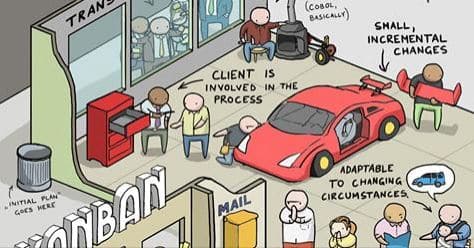The cartoon that I have used to accompany this post recently appeared on LinkedIn (attributed to Info-graphic). It’s a humorous depiction of the perennial developers’ lament: “My customer doesn’t understand me.” Accompanying the cartoon were quotes of the sort that customers might make during a software system development and implementation:
“Can we squeeze in (this huge feature) real quick? It’s very small and shouldn’t be very hard.”
“We’ve decided to go back to the first version. And we shouldn’t pay for this as we won’t be using the code.”
Lots of IT people will chuckle and nod knowingly. But IT customers will have plenty of cartoons and quotes of their own, including: “They promised the world but delivered an atlas.”
They promised the world but delivered an atlas.
The fact is that the key to a successful software project is understanding and cooperation. In short, a partnership approach rather than an adversarial approach. IT people need to put themselves in their customers’ shoes, understand their business, and communicate effectively. Both parties have a lot of learning to do, and it is important that the software provider ensures that the customer understands what is involved in a system implementation and the disciplines that need to be followed to achieve success. The comparison to the cartoon motor car scenario is quite useful.
It’s no good the customer choosing, or the IT company delivering, a (metaphorical) sports car if a family has to be transported. It is risky and expensive to make major modifications to a car—it could be less risky and less expensive to choose a different, more suitable, car.
Both parties need to invest time at the start of the project in order to understand each other. Questions need to be asked and answered: Who will be responsible for what? What is in scope and what is out of scope? What are the risks? What contingencies will be put in place? How will changes and additions be handled? What is the balance of Time, Cost and Functionality? What are the business objectives? What business benefits are expected? These questions can be asked, discussed and settled during a Rapid Project Planning Workshop. The result should be a mutual understanding that leads to a partnership approach and a much higher chance of a successful project.







